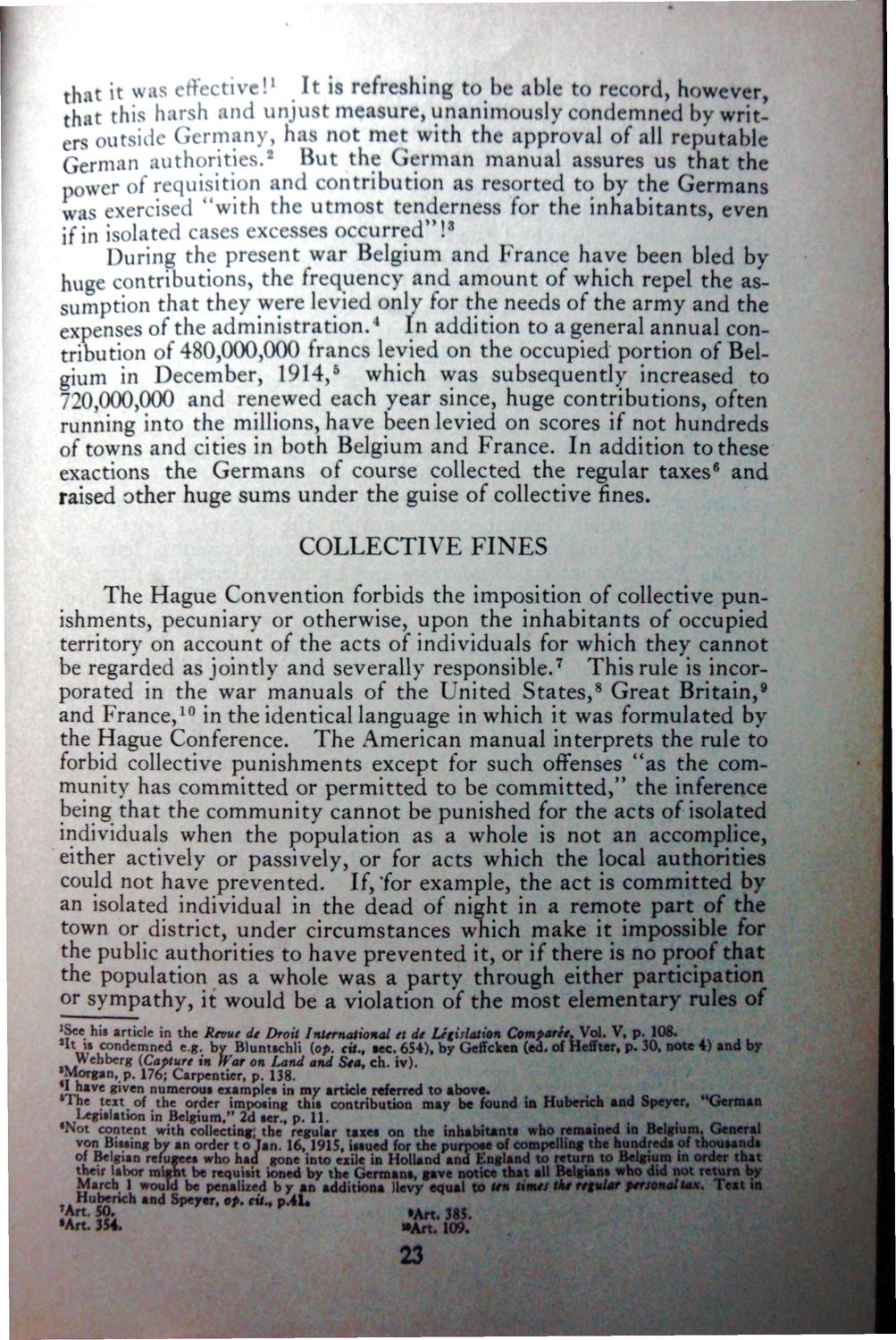| |
| |
Caption: War Publications - WWI Compilation 1923 - Article 14
This is a reduced-resolution page image for fast online browsing.

EXTRACTED TEXT FROM PAGE:
that it was effective! It is refreshing to be able to record, however, that this harsh and unjust measure, unanimously condemned by writers outside Germany, has not met with the approval of all reputable 1 German authorities. But the German manual assures us that the power of requisition and contribution as resorted to by the Germans was exercised ''with the utmost tenderness for the inhabitants, even 0 3 if in isolated cases excesses occurred ! During the present war Belgium and France have been bled by huge contributions, the frequency and amount of which repel the assumption that they were levied only for the needs of the army and the 4 expenses of the administration. In addition to a general annual contribution of 480,000,(XX) francs levied on the occupied portion of Belgium in December, 1914,• which was subsequently increased to 720,000,000 and renewed each year since, huge contributions, often running into the millions, have been levied on scores if not hundreds of towns and cities in both Belgium and France. In addition to these 6 exactions the Germans of course collected the regular taxes and raised other huge sums under the guise of collective fines. COLLECTIVE F I N E S The Hague Convention forbids the imposition of collective punishments, pecuniary or otherwise, upon the inhabitants of occupied territory on account of the acts of individuals for which they cannot 7 be regarded as jointly and severally responsible. This rule is incor8 9 porated in the war manuals of the United States, Great Britain, 10 and France, in the identical language in which it was formulated by the Hague Conference. The American manual interprets the rule to forbid collective punishments except for such offenses "as the community has committed or permitted to be committed," the inference being that the community cannot be punished for the acts of isolated individuals when the population as a whole is not an accomplice, either actively or passively, or for acts which the local authorities could not have prevented. If, for example, the act is committed by an isolated individual in the dead of night in a remote part of the town or district, under circumstances which make it impossible for the public authorities to have prevented it, or if there is no proof that the population as a whole was a party through either participation or sympathy, it would be a violation of the most elementary rules of 'See his narticle in the Revue de Droit International et de Legislation Comparee. Vol. V, p. 108. co dcm «? n c d e.g. by Blunttchli (op. cit.t tec. 654), by Geffcken (ed. of Heffter, p. 30, note 4) and by Wcbbcrg {Capture in If at on Land and Sea, ch. iv). •Morgan, p. 176; Carpentier, p. 138. vc g i v e n n u m c r Jrv* ° ™ examples in my article referred to above. •ine text of the order imposing this contribution may be found in Huberich and Speyer, German Legislation in Belgium/' 2d ser., p. 11. , . n , . •Not content with collecting; the regular taxes on the inhabitants who remained in Belgium. General von Busing by an order t o Tan. 16, 1915, issued for the purpose of compelling the hundreds of thousands of Belgian refugees who had gone into exile in Holland and England to return to Belgium in order that their labor mixlit be requisit ioned by the Germans, gave notice that all Belgians who did not return by March 1 would be penalized b y an additiona llevy equal to ten times the regular personalux* Text in Hubench and Speyer, op. eit« p.41. 1 !Art<59' »Art.38S. •Art. 354. nArt. 109. 23
| |